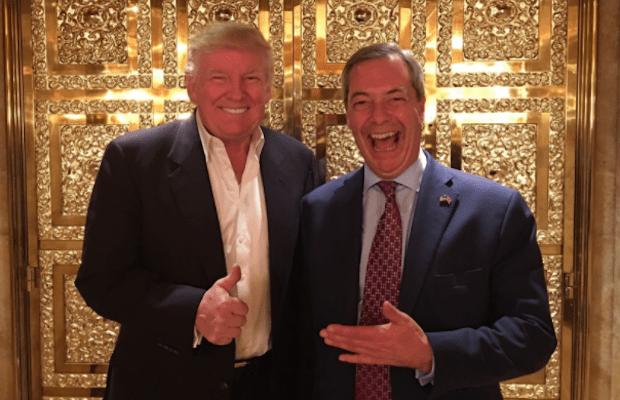Many people have remarked that the image of Donald Trump and Nigel Farage posing by the former’s golden elevator doors epitomises the hypocrisy over populists attacking the ‘elites’. Likewise the Guildhall dinner in which Theresa May told an audience dressed in dinner jackets about globalisation and its discontents. These are the ‘anti-elitists’ who now stand up for the people, they sneer. This is to confuse money with status.
As any nouveau riche parvenu has learned, wealth and status are not the same thing, something which has been the subject of some of the most famous novels in the English language. Membership of the ‘elite’, and many will argue about the definition, is not just about income but a number of markers; chief among these is belief. In all societies throughout history membership of the elite required adherence to the prestige faith.
Plenty of 17th and 18th century Nonconformists were fantastically rich – they founded such enterprises as Cadburys and the Guardian (which, being run by Unitarians, was in the 19th century vehemently Zionist). Quakers were famously good at making money – as the Puritans used to say of them, they prey on you six days a week and pray for you on the other – but by definition they could not be part of the elite because of their faith. Nonconformists could not attend any English universities until the foundation of University College London; Catholics had it even worse.
Left-liberalism is just the high-status faith of our times, like Anglicanism once was, and rich reactionaries like Trump or Farage are the equivalent of Recusant aristocrats in Tudor times. They may be privileged and high-born, but they are not welcome in polite society, and most of the people who share their faith come from way outside of the metropolitan hub (like with modern radical Progressivism, radical Protestantism was concentrated in London and Cambridge, and among academics and lawyers).
Of course 21st century Britain is far more tolerant than in the days before the Catholic Emancipation Act. You don’t have to sign up to the 39 articles of Political Correctness before getting a degree, but there certainly are penalties attached to denying the status faith, both social and material. Having ‘bad opinions’ can lose you your job and there is some evidence of discrimination against conservatives in employment. Then you have companies telling their workers that they are not welcome if they support the ‘wrong’ candidate. While many conservative Christians also regard things like the 2010 Equality Act as a modern-day Test Act which effectively pushes them out of certain areas of public life because of their beliefs about sexuality.
I wonder to what extent the ‘shy Tory’ phenomenon affecting the polling industry is influenced by a genuine fear that people will lose their jobs or be socially punished if they admit to being non-believers. None of this is to compare the gravity of persecution before the 19th century, and mild disadvantage in liberal societies that largely do their best to make things fair and accommodate everyone. But membership of the elite, or what we call ‘polite society’, does depend on adhering to a number of beliefs which the likes of Nigel Farage do not share. A struggling novelist would still probably have better access to London’s top 10,000, even if it might not often feel like they’re part of ‘the elite’.
I agree the ‘anti-elitist’ shtick from some sections of the media is tiresome, when being a journalist requires years of very low pay and as a result most are from privileged backgrounds. Likewise with politicians, some of them fantastically wealthy, but then many populist uprisings historically have been led by aristocrats, who have the means, the skills and most importantly the resentment against their peers. Back in the 12th century Londoners were roused by ‘William long beard’, a charismatic speaker who ‘plotted great wickedness in the name of justice, a conspiracy of the poor against the rich. By his fiery eloquence he inflamed both the poor and the moderately well-off with a desire for limitless freedom and happiness and with a hatred for the arrogance of the rich and noble which he painted in the blackest colours. At public meetings he proclaimed himself the ‘king of the poor, and their saviour’. He called himself the ‘advocate of the people’ but he was in reality a well-educated Anglo-Norman with the embarrassingly aristocratic name William Fitz Obsert.
The big historical exception was the Peasants Revolt, but even this was a misnomer (it wasn’t called this until the early modern period, known as ‘the Mad Multitude’ at the time) as it was largely comprised of what we’d now call the lower-middle-class. So down with the elite! Down with the people I went to university with and who make far more money than me!







Comments